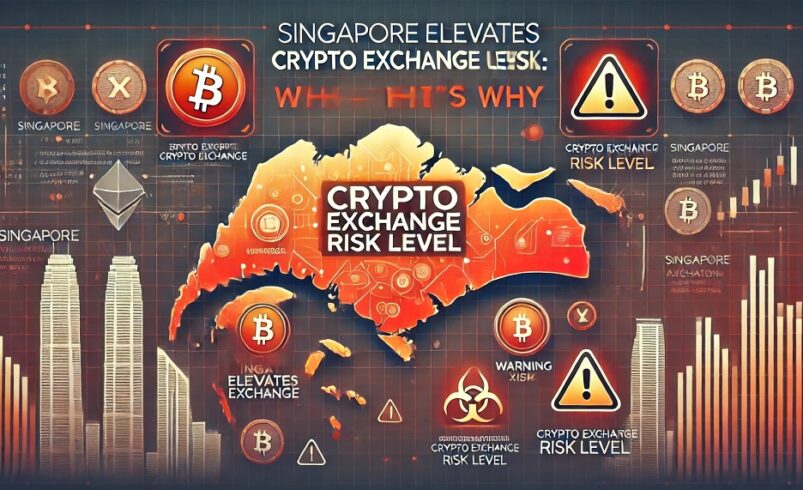Singapore Elevates Crypto Exchange Risk Level: Here’s Why

Table of Contents
The Monetary Authority of Singapore (MAS) has raised the risk level for cryptocurrency exchange platforms from medium-low to medium-high. This change is part of a broader update to Singapore’s Terrorism Financing National Risk Assessment (NRA) and National Strategy for Countering the Financing of Terrorism to safeguard the country’s financial system from misuse.
The updated risk assessment prevents terrorist groups from exploiting Singapore’s economic openness. The MAS aims to enhance regulatory oversight by implementing stringent measures to mitigate potential threats.
Singapore’s Proactive Regulatory Stance
Singapore has been at the forefront of establishing a robust regulatory framework for digital assets. A few months ago, the MAS expanded the scope of regulated payment services to include DPT service providers, bringing digital assets under its user protection laws.
Hence, the MAS can impose stricter requirements on these providers concerning AML, CFT, user protection, and financial stability. The regulatory update also ensures that cryptocurrency exchange platforms’ activities are conducted within a secure and regulated environment.
Despite the increased regulatory scrutiny, Singapore remains a leading nation in crypto adoption. The country boasts an adoption rate of 11.2%, higher than the global average of 4.2%.
The MAS has granted legal status to prominent cryptocurrencies like Bitcoin (BTC) and Ether (ETH), reinforcing the country’s position as a pro-crypto nation. This move is expected to enhance the resilience of Singapore’s financial system against illicit activities while maintaining the nation’s reputation as a safe and innovative financial hub.
Denmark Clarifies Stance on Self-Custody Wallets
Meanwhile, Denmark’s Financial Supervisory Authority (DFSA) has clarified its stance on self-custodial cryptocurrency wallets. In an official statement, it dispelled rumors circulating on social media about a potential ban on such wallets.
The confusion arose after the Markets in Crypto-Assets (MiCA) Regulation came into full force on June 30. In a recent interview, Tobias Thygesen, the director for fintech, payments services, and governance at the DFSA, addressed the misinformation.
He reiterated that the DFSA has no intention of banning hardware or non-custodial wallets, contrary to false information circulating on social media. By their nature, self-custodial wallets do not involve the custody of private keys by an intermediary.
This characteristic places them outside MiCA’s regulatory framework, which focuses on activities involving intermediaries, such as crypto custody, trading, and other related services. Thygesen explained that the only regulated activity related to wallets is custodial services, where a provider holds and manages clients’ crypto assets. Since hardware wallets keep private keys in the user’s possession, they don’t qualify as custodial services and are not subject to MiCA regulations.
Ensuring Innovation and Security
The DFSA’s clarification followed its regulatory assessment of decentralization within the context of MiCA. The assessment provided appropriate measures to clarify decentralized crypto asset services regulation.
The exemption of self-custodial wallets was intended to acknowledge their decentralized nature, not to suggest their prohibition. Mikko Ohtamaa, the co-founder of the algorithmic investment protocol Trading Strategy, initially spread misinformation regarding this issue. In a post on social media platform X, he misinterpreted the exemption as an indication of Denmark’s intention to ban such wallets.
Time Crypto Market offers content visibility for dozens of crypto enterprises, and you can be a part of our network! Reach out to us on our telegram chat for inquiries. The nature of cryptocurrencies is highly unpredictable; always perform your due diligence before any investment. Several articles on our site come from guest contributors or are commissioned pieces, not originating from Time Crypto Market's in-house writers. The perspectives shared in these articles might not necessarily align with those of Time Crypto Market. We do not assume responsibility for the veracity, caliber, promotions, offerings, or any other elements presented on our platform. Consult our comprehensive terms of service and disclaimer for more details.








